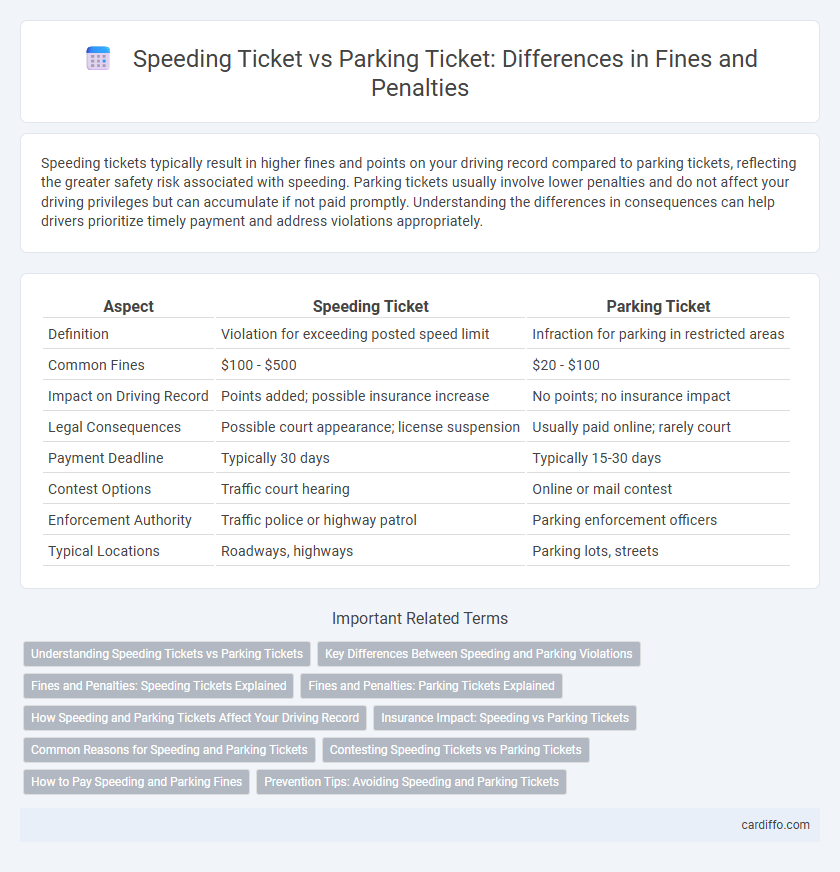Speeding tickets typically result in higher fines and points on your driving record compared to parking tickets, reflecting the greater safety risk associated with speeding. Parking tickets usually involve lower penalties and do not affect your driving privileges but can accumulate if not paid promptly. Understanding the differences in consequences can help drivers prioritize timely payment and address violations appropriately.
Table of Comparison
| Aspect | Speeding Ticket | Parking Ticket |
|---|---|---|
| Definition | Violation for exceeding posted speed limit | Infraction for parking in restricted areas |
| Common Fines | $100 - $500 | $20 - $100 |
| Impact on Driving Record | Points added; possible insurance increase | No points; no insurance impact |
| Legal Consequences | Possible court appearance; license suspension | Usually paid online; rarely court |
| Payment Deadline | Typically 30 days | Typically 15-30 days |
| Contest Options | Traffic court hearing | Online or mail contest |
| Enforcement Authority | Traffic police or highway patrol | Parking enforcement officers |
| Typical Locations | Roadways, highways | Parking lots, streets |
Understanding Speeding Tickets vs Parking Tickets
Speeding tickets are issued for exceeding the posted speed limits and typically carry fines, points on the driver's license, and potential increases in insurance rates, reflecting their impact on road safety. Parking tickets result from illegal or improper parking violations and usually involve fixed fines without affecting driving records or insurance premiums. Understanding these distinctions helps drivers recognize the legal consequences and prioritize safe driving habits over mere compliance with parking regulations.
Key Differences Between Speeding and Parking Violations
Speeding tickets arise from exceeding posted speed limits, posing immediate safety risks and often resulting in higher fines and points on the driver's license. Parking tickets occur when a vehicle is improperly parked or violates local parking regulations, typically involving lower fines and no impact on driving records. The key difference lies in speeding offenses affecting driver behavior while parking violations pertain to vehicle placement.
Fines and Penalties: Speeding Tickets Explained
Speeding tickets typically carry higher fines than parking tickets, reflecting the greater risk posed by excessive speed to public safety. Penalties for speeding may include points on the driver's license, increased insurance premiums, and in severe cases, license suspension or mandatory driving courses. Parking tickets usually result only in monetary fines without impacting driving records or insurance rates.
Fines and Penalties: Parking Tickets Explained
Parking tickets typically carry lower fines compared to speeding tickets, often ranging from $25 to $100 depending on the city and violation severity. Penalties for parking violations generally do not include points on a driving record or increased insurance premiums, unlike speeding tickets that can result in significant fines, points, and higher insurance costs. Timely payment of parking fines often avoids additional late fees or vehicle immobilization, making these penalties less severe but still important to address promptly.
How Speeding and Parking Tickets Affect Your Driving Record
Speeding tickets typically add more points to your driving record than parking tickets, which often do not affect your points at all. Accumulating points from speeding violations can lead to increased insurance premiums and potential license suspension, while parking tickets primarily result in fines without impacting your driving history. Maintaining a clean driving record by avoiding speeding infractions is crucial for preserving insurance rates and driving privileges.
Insurance Impact: Speeding vs Parking Tickets
Speeding tickets typically have a significant impact on car insurance premiums due to their association with risky driving behavior and increased accident likelihood. Parking tickets, being non-moving violations, generally do not affect insurance rates as they do not indicate driver fault or safety concerns. Insurance companies prioritize moving violations like speeding when calculating risk and setting premium costs.
Common Reasons for Speeding and Parking Tickets
Speeding tickets commonly result from exceeding posted speed limits, aggressive driving, or reckless behavior in zones such as school areas or construction sites. Parking tickets often stem from violations like expired meter times, parking in no-parking zones, or obstructing fire hydrants and driveways. Understanding these common causes helps drivers avoid infractions and maintain compliance with traffic laws.
Contesting Speeding Tickets vs Parking Tickets
Contesting speeding tickets typically involves providing evidence such as calibrated radar or lidar readings, officer testimony, or demonstrating a legitimate reason for speeding, whereas parking ticket disputes often require proof of valid permits, signage issues, or meter malfunctions. Speeding ticket cases may demand court appearances and legal knowledge of traffic laws, while parking ticket contests are usually resolved through administrative reviews or hearings with municipal authorities. Understanding the specific procedures and evidence requirements for each type improves the chances of successfully contesting the ticket.
How to Pay Speeding and Parking Fines
Paying speeding tickets typically involves visiting the issuing police department's website, using online payment portals, or mailing a check along with the ticket details. Parking fines can often be settled through automated kiosks, municipal websites, or mobile apps specific to the city's parking authority. Prompt payment of both types of fines avoids additional penalties and potential license suspensions.
Prevention Tips: Avoiding Speeding and Parking Tickets
Maintaining consistent awareness of speed limits and parking regulations significantly reduces the risk of receiving speeding or parking tickets, as adherence helps avoid violations. Utilizing technology such as GPS-based speed alerts and parking reminder apps supports compliance by providing real-time feedback and notifications. Regularly reviewing local traffic laws and planning routes with designated parking areas further prevents unintended infractions and costly fines.
Speeding ticket vs parking ticket Infographic

 cardiffo.com
cardiffo.com